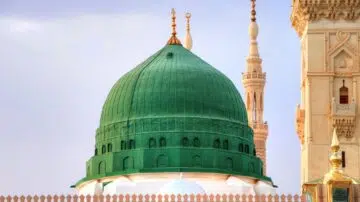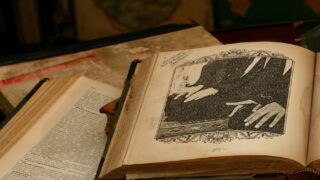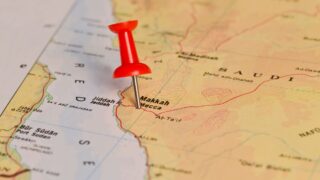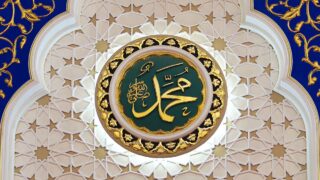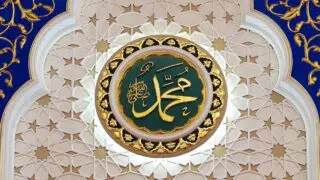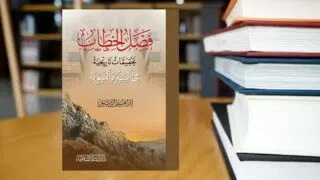We are soon approaching the 12th month of the Islamic calendar: Dhul-Hijjah. It is the period of Hajj — the days of which Allah says, (And laud Allah during the Appointed Days) (Al-Baqarah 2:203).
Legacy of Prophet Abraham
Prophet Abraham (peace be upon him) is considered the first international personality. He was born in Ur or Urfa (in modern-day Iraq or Turkey). He traveled throughout the Middle East, lived in Jerusalem, and ventured to Makkah. He was then buried in Hebron in modern-day Palestine.
Today, each of these places is still of historic, religious, and spiritual significance. In the Glorious Qur’an, Abraham is referred to as the inspired, most truthful, Prophet, mild, imploring, penitent, upright, soft-hearted, and long-suffering. The believers are called the people or community of Abraham many times in the Qur’an. Almighty Allah says,
(And they say, “Be Jews or Christians — you will be rightly guided.” Say (unto them, O Muhammad), “Nay, but (we follow) the religion of Abraham, the upright, and he was not of the polytheists.”) (Al-Baqarah 2:135)
(And who has a better religion than he who submits himself entirely to Allah while doing good (to others) and follows the faith of Abraham, the upright? And Allah took Abraham as a friend.) (An-Nisaa’ 4:125)
(Indeed, I (Joseph) have forsaken the religion of a people who do not believe in Allah, and they are deniers of the hereafter. And I have followed the religion of my fathers, Abraham and Isaac and Jacob. It never was for us to attribute aught as partner to Allah. This is of the bounty of Allah unto us (the seed of Abraham) and unto humankind, but most people do not give thanks.) (Yusuf 12:37–38)
(And We bestowed on him Isaac and — as an additional gift (a grandson) — Jacob, and We made righteous men of every one of them. And We made them leaders who guided (people) by Our command, and We inspired in them the doing of good deeds and the keeping up of Prayer and the giving of the alms, and they were worshippers of Us (alone).) (Al-Anbiyaa’ 21:72–73)
Another verse in the Qur’an describes Abraham as the father of all believers. Almighty Allah says,
(And strive hard in (the way of) Allah, (such) a striving as is due to Him; He has chosen you and has not laid upon you any hardship in religion: The faith of your father Abraham; He named you Muslims before and in this (Revelation) that the Messenger may be a bearer of witness to you and you may be bearers of witness to the people…) (Al-Hajj 22:78)
As one reflects upon the unique legacy of Abraham, Ishmael, and Hagar (who are all models of excellence), one ponders over Abraham’s logical attitude in his search for truth, his respectful debate with his unbelieving father, and his loving relationship with his son. All these serve as timeless examples of excellence for humanity.
True Believers are those who follow the way of Abraham. Perchance, in all walks of life, we too can imbibe the spirit of Abraham if we truly understand the purpose of our existence. Almighty Allah says,
(Say, “Surely my Prayer and my sacrifice and my life and my death are (all) for Allah, Lord of the Worlds.) (Al-An`am 6:162)
Legacy of Mary
Islam also tells us of the glorious legacy of Mary and her son, Jesus, the Messiah. Mary is the only woman who is mentioned by her name in the Qur’an. In Islam, she is considered a prominent figure and role model for all humanity. Almighty Allah says,
([And Allah sets forth an example for those who believe: the wife of Pharaoh …] And Mary, daughter of `Imran, who guarded her chastity, so We breathed into her of Our inspiration, and she accepted the truth of the words of her Lord and His books, and she was of the devout (servants).) (At-Tahrim 66:12)
Almighty Allah mentions Mary more times in the Qur’an. In fact, Mary’s biographical information in the Qur’an exceeds what is mentioned about her in the entire New Testament.
The Qur’anic account includes the pregnancy of Mary’s mother, the birth and edification of Mary, and the annunciations of the coming of Jesus. Almighty Allah says,
(And (remember) her who guarded her chastity, so We breathed into her of Our inspiration and made her and her son a sign for (all) peoples.) (Al-Anbiyaa’ 21:91)
Jesus, the Messiah
Some people regard Jesus (peace be upon him) as a fictional character. He is also falsely accused of being an illegitimate child by some and misconceived as divine by many. However, In Islam, he is considered Allah’s servant and Prophet.
In the Qur’an, a number of honorable epithets and attributes are joined to the name Jesus: Prophet; Messenger of Allah; the Messiah; son of Mary; word of Allah; inspiration from Allah; mercy from Allah; eminent in this world and the hereafter and of the righteous.
People do have differing perspectives on the life and teachings of Jesus. However, his spiritual legacy as a righteous and principled guide and his mission as a “prince of peace” offer an alternative opportunity for people of faith to recognize their shared religious heritage. Allah bears witness to the truthfulness of Jesus — his mission, his character, his status, and his very being. In the Qur’an, after the story of the birth of Jesus is related, Almighty Allah says,
(Such is Jesus, son of Mary: (This is) the saying of truth about which they dispute.) (Maryam 19:34)
Prophet Muhammad’s Farewell Sermon
On Dhul-Hijjah 9, AH 10 (632 CE), Prophet Muhammad (peace and blessings be upon him) delivered a historic sermon on Mount `Arafat in `Uranah Valley near Makkah. In this sermon, which later came to be known as the Farewell Sermon, the Prophet recapped the essential message of his mission. The teachings of this sermon can be listed as follows:
1. Supremacy of the Creator. Almighty Allah says,
(All praise is due to Allah, Lord of the Worlds, Most Gracious, Most Merciful, Master of the Day of Judgment.) (Al-Fatihah 1:2–4)
2. Mission of the Prophets (conveying the message). Almighty Allah says,
(O Prophet, surely We have sent you as a witness and as a bearer of glad tidings and as a warner.) (Al-Ahzab 33:45)
3. Fulfillment of trusts and importance of individual accountability. Almighty Allah says,
(Surely Allah commands you to make over trusts to their owners and that when you judge between people you judge with justice; surely Allah admonishes you with what is excellent; surely Allah is All-Hearing, All-Seeing.) (An-Nisaa’ 4:58)
4. Sanctity of human life, human integrity, and human property. Almighty Allah says,
(For this reason did We decree for the children of Israel that (for) whoever slays a soul, unless it be for manslaughter or for mischief in the land, it is as though they slew all humankind, and (for) whoever keeps it alive, it is as though they kept alive all humankind, and certainly Our Messengers came to them with clear arguments, but even after that many of them certainly act extravagantly in the land.) (Al-Ma’idah 5:32)
And the Prophet said,
“O people, your blood, your property, and your honor are sacred to you like the sacredness of this day of yours, in this city of yours, and in this month of yours until the Day when you meet your Lord.” (Al-Bukhari)
“You will indeed meet your Lord, and He will ask you about your deeds.” (Muslim)
5. Fulfillment of obligations. Almighty Allah says,
(And if one of you entrusts another, then let him who is trusted deliver up that which is entrusted to him (according to the pact between them), and let him observe his duty toward Allah, his Lord. And do not conceal testimony, and whoever conceals it, their heart is surely sinful, and Allah is Ever-Aware of what you do.) (Al-Baqarah 2:283)
6. Avoidance of improper financial dealings. The Prophet said,
“Allah has forbidden that you take riba (usury or interest); therefore all obligations of riba will henceforth be waived.”
7. Adherence to marital harmony. The Prophet said,
“Fear Allah concerning women. Verily you have taken them on the covenant of Allah, and intercourse with them has been made lawful unto you by words of Allah.” (Abu Dawud)
8. Abstinence from all forms of evil. Almighty Allah says,
(Verily Satan is an enemy to you, so treat him as an enemy; he only invites his party that they may be the inmates of the Flaming Fire.) (Fatir 35:6)
9. Fraternity of the Ummah (universality of the community of faith). The Prophet said,
“Learn that every Muslim is the brother of another Muslim. Nothing belonging to a fellow Muslim shall be legitimate for another Muslim, unless it was given freely and willingly.” (At-Tirmidhi)
10. Equality between humans and eradication of racial prejudice. The Prophet said,
“O people, [mind that] your Lord is One and your father (i.e. Adam) is one. Except by piety and good deeds, an Arab has no superiority over a non-Arab, a non-Arab has no superiority over an Arab, a white has no superiority over a black, and a black has no superiority over a white.” (Ahmad)
11. Subjection to the commands of Allah and His Messenger. The Prophet said,
“I will leave behind me two things; if you follow them, you will never go astray: [These are] Allah’s Book and my Sunnah.” (Authenticated by Al-Albani)
12. Adherence to the pillars of Islam. The Prophet said,
“Oh people, listen to me earnestly. Worship Allah; perform your five daily prayers; fast during the month of Ramadan; give the share of zakah [obligatory alms] from your wealth.” (Ahmad)
13. Muhammad is the Last Messenger. Almighty Allah says,
(Muhammad is not the father of any of your men, but he is the Messenger of Allah and the Seal of the Prophets, and Allah is Ever-Aware of all things.) (Al-Ahzab 33:40)
14. Muslims’ duty of conveying the message. The Prophet said,
“Behold! Let those who are present inform those who are absent.” (Muslim)
We all need to reflect on the lives of Abraham, Mary, Jesus, and Muhammad. All these noble personalities came as guides for humanity. The questions that we, as believers, should ask are, “What lessons do we learn from these noble examples? How do we reflect the values they taught in our lives?”
By Sheikh Sadullah Khan
** Sheikh Sadullah Khan completed Memorization of the Holy Qur’an (1969). He attained a Bachelor of Arts Law Degree at University of Durban-Westville, Sub-Majoring in Islamic Studies and Arabic and completed a Higher Diploma in Journalism through Trans-World College in Jersey, UK. He pursued further studies in Qur’anic Sciences at Al-Azhar in Cairo, Egypt (1986-1990) and completed Post-Graduate programs on Methodology of Presentation of Islam as well as on Comparative Religion at Al-Azhar. Currently serves as the Director of Religious Affairs at the Islamic Center of Irvine, (ICOI).

